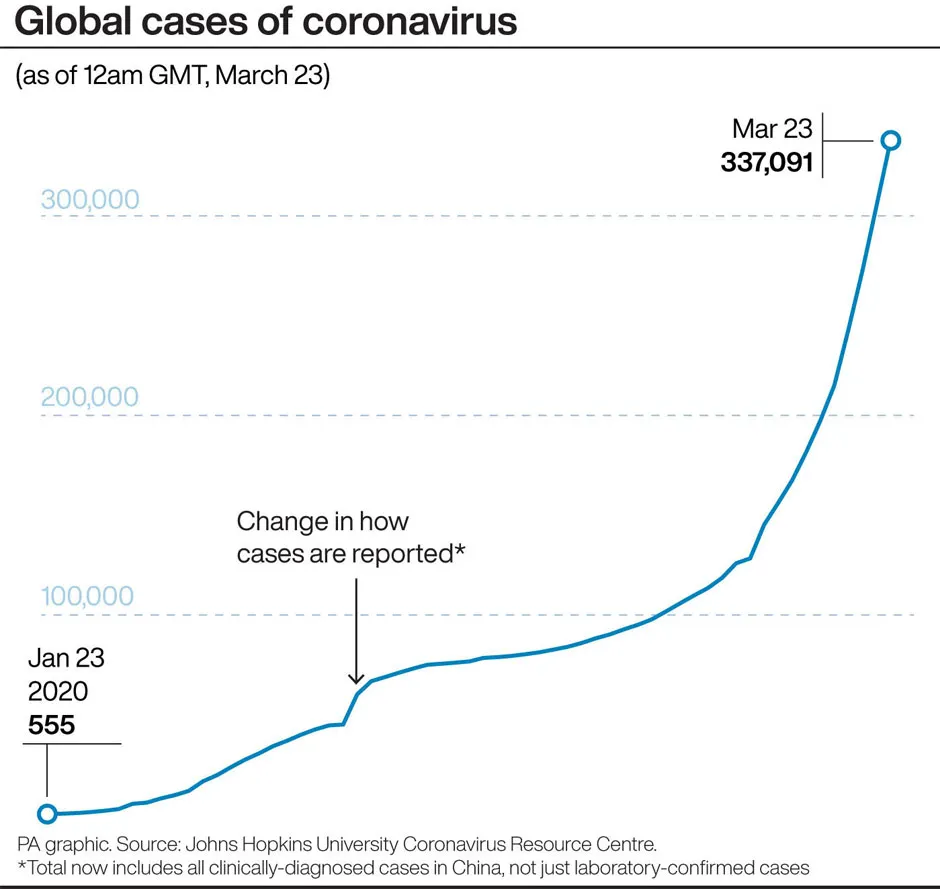- Seven coronavirus patients in UK hospitals have become the first to enrol in a clinical trial for COVID-19 treatments.
- The trial will be rolled out to thousands of patients around the UK.
- Participants will receive existing drugs, which have been proven to be safe, and are currently used to treat other conditions.
The first UK patients have been enrolled in a clinical trial for possible COVID-19 treatments.
Researchers from the University of Oxford have launched a new clinical trial to test the effects of potential drug treatments for patients admitted to hospital with the virus.
There are currently no specific treatments for the coronavirus and it is possible some existing drugs used for other conditions may have some benefits.
Read more coronavirus news:
- Coronavirus: £20m for team to 'unlock the secrets' of COVID-19
- Coronavirus test: Portable kit could test 16 NHS staff in just 50 minutes
The treatments initially included in the study have been recommended by an expert panel that advises the chief medical officer in England.They are Lopinavir-Ritonavir, which is normally used to treat HIV, and the steroid dexamethasone, which is used in a wide range of conditions to reduce inflammation.The side effects and safety of both drugs are already well known.
Other potential treatments will also be assessed by the trial in the future.
Peter Horby, professor of emerging infectious diseases and global health in the Nuffield department of medicine, University of Oxford, and chief investigator for the trial, said: “There is an urgent need for reliable evidence on the best care for patients with COVID-19. Providing possible new treatments through a well-designed clinical trial is the best way to get that evidence.”
He added: “All patients will receive the standard full medical care, regardless of which treatment group they are placed in.”

Adult inpatients who have tested positive for COVID-19 in NHS hospitals, and not been excluded for medical reasons, will be offered the chance to take part in the trial.Participants will be allocated at random by computer to receive one of the two drugs being studied or no additional medication.
This will enable researchers to see whether any of the possible new treatments are more or less effective than those currently used for patients with the virus.
Read more about COVID-19:
- What nature can teach us about friendship in the time of coronavirus
- Coronavirus: can herd immunity protect us from COVID-19?
Martin Landray, professor of medicine and epidemiology at the Nuffield department of population health, and deputy chief investigator, added: “The streamlined design of this clinical trial allows consenting patients to be enrolled in large numbers easily and without compromising patient safety or adding significantly to the workload of busy hospitals and their staff.
“In this way we can rapidly assess the value of potential treatments for COVID-19 and provide reliable information on the best ways to treat patients with this disease.”
Chief medical officer Professor Chris Whitty and NHS England medical director Professor Stephen Powis have written to NHS trusts in England asking them to fully support the new trial.
The trial opened on 19 March, and is currently running at two hospitals with seven patients.Researchers are aiming to roll it out to more than 150 hospitals over the next two weeks, hoping to eventually enrol thousands of participants.
How do scientists develop vaccines for new viruses?
Vaccines work by fooling our bodies into thinking that we’ve been infected by a virus. Our body mounts an immune response, and builds a memory of that virus which will enable us to fight it in the future.
Viruses and the immune system interact in complex ways, so there are many different approaches to developing an effective vaccine. The two most common types are inactivated vaccines (which use harmless viruses that have been ‘killed’, but which still activate the immune system), and attenuated vaccines (which use live viruses that have been modified so that they trigger an immune response without causing us harm).
A more recent development is recombinant vaccines, which involve genetically engineering a less harmful virus so that it includes a small part of the target virus. Our body launches an immune response to the carrier virus, but also to the target virus.
Over the past few years, this approach has been used to develop a vaccine (called rVSV-ZEBOV) against the Ebola virus. It consists of a vesicular stomatitis animal virus (which causes flu-like symptoms in humans), engineered to have an outer protein of the Zaire strain of Ebola.
Vaccines go through a huge amount of testing to check that they are safe and effective, whether there are any side effects, and what dosage levels are suitable. It usually takes years before a vaccine is commercially available.
Sometimes this is too long, and the new Ebola vaccine is being administered under ‘compassionate use’ terms: it has yet to complete all its formal testing and paperwork, but has been shown to be safe and effective. Something similar may be possible if one of the many groups around the world working on a vaccine for the new strain of coronavirus (SARS-CoV-2) is successful.
Read more: